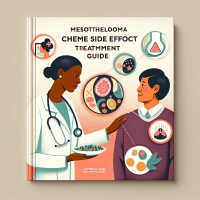Dear reader,

My name is Lisa, a registered nurse with over 10 years of experience in oncology. I understand how devastating a diagnosis of Mesothelioma can be, not just physically but emotionally. In this guide, I share my insights on Mesothelioma diet and nutrition as a tool to help you feel stronger and more hopeful during this challenging journey. Together, we’ll explore how every meal can be a step toward healing.
Understanding Mesothelioma and Its Nutritional Challenges
Mesothelioma affects not only your body but also your spirit. I have witnessed firsthand how the right nutrition can support energy levels and help manage the side effects of treatments such as chemotherapy. When you adopt a diet focused on healing—with nutrient-dense foods and mindful eating—you empower your body to better handle the impacts of this illness.
Nutrition is especially vital when dealing with the physical demands of treatments and the emotional toll of the diagnosis. Ensuring that your meals provide balanced energy can help in maintaining strength and clarity of mind.
Community strength through mindful nutrition.
Key Nutritional Needs for Mesothelioma Patients
Every individual’s nutritional needs can vary, especially when facing mesothelioma. Here, I share essential tips to address the combined requirements of physical and emotional health during treatment:
Managing Energy Levels
Dealing with fatigue is common during treatment. It is important to consume a balanced mix of carbohydrates, protein, and healthy fats to maintain energy throughout the day. Foods like lean meats, whole grains, and healthy fats (such as avocados) not only fuel the body but also help stabilize mood and energy.
Adapting to Treatment Side Effects
Side effects like nausea and a diminished appetite can make eating difficult. Eating small, frequent meals and choosing foods that are easy on the stomach—such as broths, steamed vegetables, and light proteins—can help manage these symptoms. I encourage you to consider what feels right for your body, always in consultation with your healthcare provider.
The Power of Antioxidants
Antioxidants are essential in reducing oxidative stress caused by cancer treatments. Incorporating a variety of fruits (like berries) and vegetables (such as leafy greens) can support cellular repair and bolster your immune system. Medical resources like the American Cancer Society have emphasized the importance of antioxidants as part of a holistic approach to patient care.
Creating Your Personalized Mesothelioma Diet Meal Plan
I know many of you ask, “What should I eat?” Here’s a sample meal plan that can be adapted to your tastes and needs:
- Breakfast: A warm bowl of oatmeal topped with berries and a handful of nuts.
- Lunch: Grilled chicken mixed with a colorful salad, including greens, carrots, and a drizzle of olive oil.
- Dinner: Steamed fish paired with sweet potatoes and a medley of steamed vegetables.
- Snacks: Yogurt, fresh fruits, or a small portion of nuts to keep energy stable throughout the day.
This simple guide is meant to serve as a starting point. Every patient is unique, so it is important to tailor these principles to your individual needs.
Beyond Food: Embracing a Holistic Approach to Wellness
Nutrition isn’t solely about food—it’s a part of a holistic approach to healing that includes mental, emotional, and physical support. Here are a few additional tips for building overall wellness:
- Hydration: Aim for 8-10 glasses of water daily to support digestion and overall health.
- Mindful Eating: Create a calm space when eating. Take a moment to enjoy your food and appreciate the nutrients it provides.
- Light Exercise: Gentle activities, whether a short walk or light stretching, can help boost mood, as long as your doctor approves.
Understanding Diagnosis, Staging, and Treatment Options
An understanding of your diagnosis and treatment stage can greatly influence how you manage your nutrition. Here is a simplified view:
| Stage | Description |
|---|---|
| Stage 1 | The cancer is localized and may respond better to aggressive treatment. |
| Stage 2 | There is some growth, and treatments may combine surgery with radiation or chemotherapy. |
| Stage 3 | The cancer has spread regionally requiring more complex treatment plans. |
| Stage 4 | Cancer has metastasized; focus shifts to symptom management and quality of life. |
Understanding your stage helps in aligning your nutritional plan with your treatment goals. Do discuss these aspects with your doctors to adjust your nutritional intake according to your needs.
Together, we build resilience and strength through every meal.
Mental and Emotional Well-being Through Nutrition
Emotional health is as important as physical nutrition. In my years of experience, I have seen how the act of preparing and savoring a meal can be therapeutic. Here are a few mindful practices:
- Mindfulness or Meditation: Spending just a few minutes in meditation can reduce anxiety and help ground you in the present moment.
- Sharing Meals: Eating with family or a support group can provide comfort and lift your spirits.
- Professional Support: Consider speaking with a mental health professional who understands cancer care if you feel overwhelmed.
In my experience, every carefully prepared meal is a small act of self-love and resilience. I invite you to see each meal as a moment of strength in your journey.
Communicating with Your Healthcare Team
Effective communication with your healthcare team is paramount. When discussing diet and nutrition, consider these tips:
- Prepare a list of questions regarding your dietary needs during treatment.
- Share openly about any side effects you experience and how they affect your appetite.
- Request referrals to a dietitian who specializes in oncology care for personalized guidance.
Remember, your treatment plan is unique to you, and your questions are important in tailoring that plan to fit your life and needs.
Resources and Next Steps
I hope this guide has provided you with valuable insights on managing your nutrition during the mesothelioma journey. For additional information, please visit our internal articles on Mesothelioma Treatment Options and Mesothelioma Patient Support to explore further resources and community support.
Information on treatment guidelines is current as of May 2025. While I offer these insights with compassion and professional experience, please consult your healthcare provider for personalized advice.
Final Thoughts: A Holistic Path to Healing
Your health journey is deeply personal, marked by bravery and resilience with every step. Embrace your meals as moments of healing and self-care, and never hesitate to reach out for support – be it medical, nutritional, or emotional. I am here, with profound care, to support you every step of the way.
In the midst of uncertainty, our shared moments of care build the strength needed to face each day. Together, we can overcome the challenges with hope, compassion, and unwavering support.






